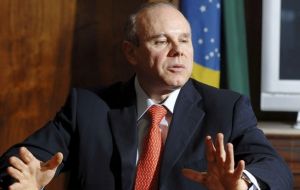MercoPress. South Atlantic News Agency
Brazil unveils tax on ADR to help contain appreciation of the Real
 Minister Guido Mantega concerned the strong Real will harm Brazilian exports
Minister Guido Mantega concerned the strong Real will harm Brazilian exports Brazil took another step on Wednesday aimed at containing the appreciation of its currency, unveiling a 1.5% tax on certain trades involving American Depository Receipts, ADR, issued by Brazilian companies. Finance minister Guido Mantega said the tax will be charged when foreign investors convert ADRs for Brazilian companies into receipts for shares issued locally.
As of Thursday the tax of 1.5% will be levied on the creation of depositary receipts by companies or investors converting local shares, Economic Policy Secretary Nelson Barbosa told reporters in Brasilia.
He said the move will “balance” out distortions caused by a 2% tax that was imposed last October on foreign investment in local bonds and stocks in a bid to stem a currency rally.
A Sao Paulo-based spokesman at BM&FBovespa SA, the operator of Latin America’s largest exchange, declined to comment. The New York Stock Exchange had no comment.
The Bovespa slid 1.3% Wednesday and the Real declined 0.8% to 1.7255 per dollar. The Real has rallied the most in emerging markets this year, 34%, a surge Mantega said threatens the country’s exports when they implemented the 2% tax on Oct. 19. The currency has been little changed since then, sliding 0.4 % to 1.755 per dollar.
Investors can buy ADRs of Brazilian companies and then cancel the depositary receipts and get the underlying share without paying the IOF tax. With the new measure, the Finance Ministry aims to eliminate the incentive to create new ADRs that allow investors to skirt the levy.
Under the new rule, a company or individual investor that deposits a share with a custodian bank to create a new ADR will be charged the tax at the bank, Barbosa said.
Edemir Pinto, chief executive officer of BM&FBovespa, met with Finance Minister Guido Mantega last month in Brasilia to lobby for a removal of the IOF tax. Pinto said Nov. 6 the tax had been “harmful” to Brazilian markets.
Banco do Brasil SA, Latin America’s biggest bank, said earlier this month that the US had approved plans to begin trading Level 1 ADRs, which are traded over-the-counter. Chief Executive Aldemir Bendine said the ADRs may begin trading by the end of the year.
International investors added 1.14 billion Reais (660 million USD) of Brazilian stocks to their holdings in October, according to the Web site of BM&FBovespa. Investors bought 52.3 billion Reais of stock and sold 51.1 billion Reais. Inflows slowed after the government imposed the tax. Net inflows for the month reached 5 billion Reais on Oct. 19.
Foreign investment fell to about 308 million USD a day after the IOF tax, compared with 985 million USD a day for the first 12 business days of the month, the central bank said Nov. 4.




Top Comments
Disclaimer & comment rulesCommenting for this story is now closed.
If you have a Facebook account, become a fan and comment on our Facebook Page!